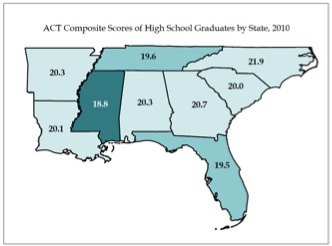Are Mississippi High School Graduates Prepared for College and Careers?
March 3rd, 2011
Key Takeaway: The average composite ACT score for Mississippi’s 2010 high school graduates is 18.8 – below the minimum score of 19 that is recognized as a measure of college readiness. Community colleges and universities face the challenge of providing effective remedial courses to ensure all students have the skills they need to succeed in college coursework and to advance to quality careers. The challenge is exacerbated by the current funding environment for community colleges.
2010 ACT Score Summary: The ACT sets a score of 19 as the minimum composite score that students need to enter and succeed in college-level courses. In 2010, Mississippi’s average composite ACT of 18.8 was the only state average below the minimum for college-readiness. The map below details state averages for ACT composite scores in 2010 for the Southern region.
Click to enlarge
Louisiana, Arkansas, and Alabama all received ACT composite scores above 20, on average. Tennessee’s average ACT composite was below 20 but above the national minimum for college-readiness.
What do Mississippi’s ACT scores mean for community colleges and universities?
Across Mississippi, community colleges and universities frequently use ACT composite scores and subject-specific scores to determine the course placement for recent high school graduates. Each community college sets a minimum ACT composite or subject score that indicates whether a student is ready for college-level courses. Students with scores below the minimum are placed in remedial courses in math, reading, and/or English designed to prepare students for success in college-level courses.
Many of Mississippi’s high school graduates are in need of remedial coursework when they enter college. The state’s community colleges and universities face a challenge of providing effective remediation for a large number of students, both recent high school graduates and those that return as adults. Ensuring that remedial courses are provided effectively to students is imperative for increasing the number of Mississippi’s students that advance toward a college degree and into quality careers.
To ensure underprepared students receive high-quality remediation, colleges will need adequate support and resources to implement improvements. As Mississippi’s leaders face a climate of limited resources, a balanced approach that includes raising revenues instead of a cuts-only approach is needed to ensure that Mississippi’s students are well supported on a long-term path toward self-sufficiency.
Source:
ACT, “The Condition of Career and College Readiness”, 2010.
Author:
Sarah Welker, Policy Analyst






